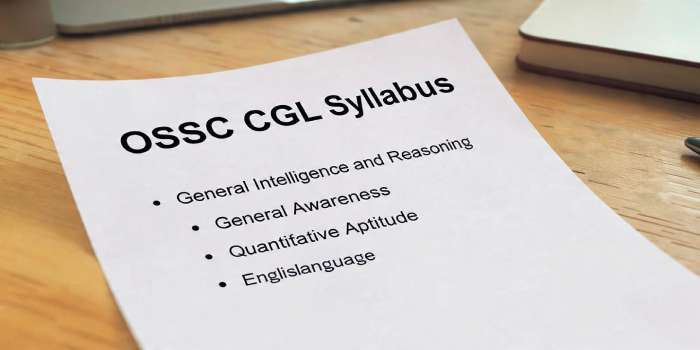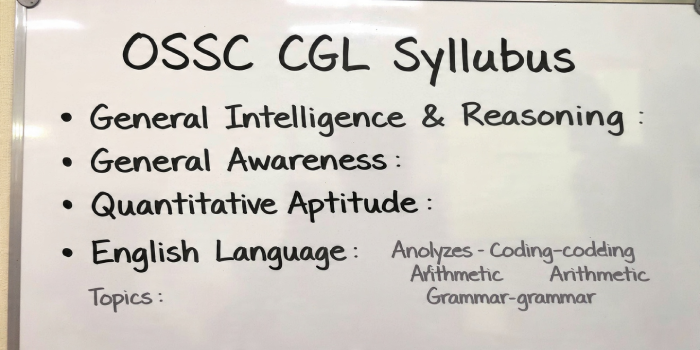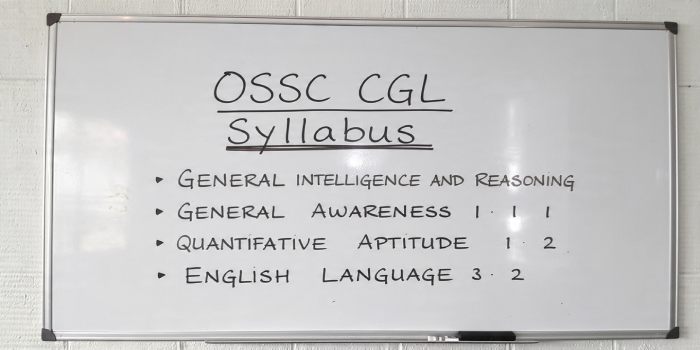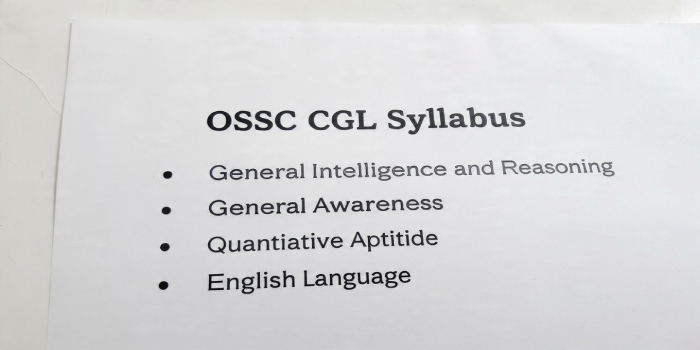The OSSC CGL syllabus is one of the most important resources for aspirants preparing for the Combined Graduate Level Examination conducted by the Odisha Staff Selection Commission (OSSC). Understanding the detailed syllabus and exam pattern is the first step toward cracking this competitive examination. This article provides a complete breakdown of the OSSC CGL syllabus, including the subjects, weightage, and preparation tips to help candidates strategize effectively.
Overview of OSSC CGL Exam
The Odisha Staff Selection Commission (OSSC) conducts the Combined Graduate Level (CGL) examination every year to recruit candidates for various Group-B and Group-C posts under the state government. The recruitment process is divided into multiple stages—Preliminary Examination, Mains Examination, and Document Verification.
To perform well, it is crucial for candidates to be familiar with the OSSC CGL syllabus, as it helps them plan their study routine and focus on high-scoring areas.

OSSC CGL Exam Pattern 2025
Before diving into the syllabus, let’s understand the exam pattern for both stages:
1. Preliminary Examination
- Mode of Exam: Online (CBT)
- Type of Questions: Objective (Multiple Choice)
- Total Marks: 150
- Duration: 150 Minutes
- Subjects Covered: General Awareness, Quantitative Aptitude, Reasoning Ability, and English Language.
2. Mains Examination
The Mains Exam consists of two papers:
- Paper I – Language (Odia and English)
- Paper II – General Studies (Mathematics, Reasoning, Computer Knowledge, Current Affairs, etc.)
Each paper carries 100 marks, and the questions are objective in nature. The final merit list is prepared based on the marks obtained in the Mains Exam.

Detailed OSSC CGL Syllabus 2025
1. General Awareness
This section tests the candidate’s understanding of current and historical events. The topics include:
- History of India and Odisha
- Indian Polity and Constitution
- Indian Economy
- Geography of India and World
- Current Events – National & International
- Environmental Issues
- Science and Technology
- Important Books and Authors
- Sports and Awards
- Static GK related to Odisha
2. Quantitative Aptitude
Candidates must have strong numerical skills to score well in this section. Major topics include:
- Number System
- Simplification and Approximation
- Ratio and Proportion
- Average and Percentage
- Time, Speed, and Distance
- Time and Work
- Simple and Compound Interest
- Profit and Loss
- Data Interpretation
- Mensuration
- Probability and Permutations
3. Reasoning Ability
This section checks analytical and logical reasoning skills. Topics are:
- Coding-Decoding
- Blood Relations
- Syllogism
- Puzzles and Seating Arrangement
- Analogies
- Series Completion
- Directions and Distance
- Statement and Conclusion
- Classification
- Decision Making
4. English Language
English proficiency is tested through grammar and comprehension-based questions:
- Vocabulary and Synonyms/Antonyms
- Sentence Correction
- Error Spotting
- Reading Comprehension
- Active and Passive Voice
- Direct and Indirect Speech
- Cloze Test
- Para Jumbles
5. Odia Language (For Mains)
This section focuses on the candidate’s command over the Odia language:
- Odia Grammar and Usage
- Translation (English to Odia and vice versa)
- Comprehension Passage
- Vocabulary and Proverbs
- Essay and Letter Writing
6. General Studies
In Paper II of the Mains exam, the OSSC CGL syllabus for General Studies includes:
- Indian History and Freedom Struggle
- Geography of India and Odisha
- Indian Polity
- General Science
- Computer Awareness
- Environmental Studies
- Current Affairs (State and National)
- Numerical and Logical Reasoning
Preparation Tips for OSSC CGL Syllabus
- Understand the Syllabus Thoroughly:
Go through the OSSC CGL syllabus in detail and create a subject-wise study plan. - Focus on Current Affairs:
Keep yourself updated with daily news, especially related to Odisha state government schemes and policies. - Practice Mock Tests and Previous Papers:
Attempting OSSC CGL mock tests helps you analyze your preparation level and identify weak areas. - Time Management:
Divide your study hours among different sections and stick to a daily schedule for consistent progress. - Revision is Key:
Regular revision of important formulas, dates, and concepts is essential to retain information until the exam day.

OSSC Admit Card – Important Information
The OSSC Admit Card is a mandatory document that candidates must download before appearing for the exam. It contains essential details such as the exam date, venue, and roll number. The admit card is usually released on the official OSSC website a few weeks before the examination. Candidates should carefully verify all information printed on the OSSC Admit Card and carry a valid ID proof to the exam center.
To avoid last-minute issues, always download your OSSC Admit Card well in advance and keep multiple copies for safety.
FAQs on OSSC CGL Syllabus 2025
What are the major subjects in the OSSC CGL syllabus?
The syllabus includes General Awareness, Quantitative Aptitude, Reasoning, English, Odia Language, and General Studies.
Is there a negative marking in the OSSC CGL exam?
Yes, usually 0.25 marks are deducted for each incorrect answer in the objective-type questions.
What is the total duration of the OSSC CGL Preliminary Exam?
The preliminary exam lasts for 150 minutes, comprising 150 multiple-choice questions.
Where can I find updates on the OSSC Admit Card release?
Candidates can find the latest updates about the OSSC Admit Card and exam schedule on the official website of the Odisha Staff Selection Commission.
How should I prepare for the General Awareness section?
Read newspapers daily, follow current affairs portals, and refer to standard books on Indian History, Geography, and Polity.

